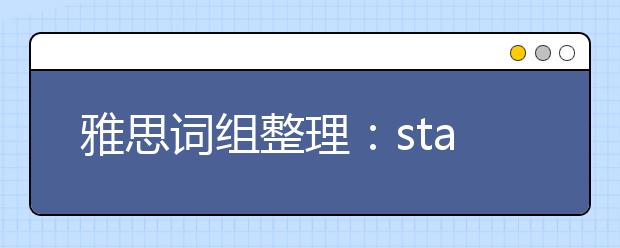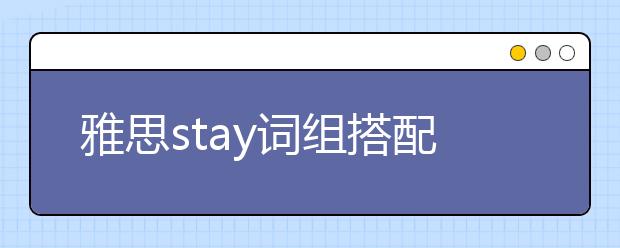当前城市:淄博[切换]
- 手机雅思无忧

扫码登录
雅思考试主要是通过对考生听、说、读、写四个方面英语能力的考核,综合测评考生的英语沟通运用能力,实现“沟通为本”的考试理念。对于雅思考生来说,也有很多考试难点和政策盲区需要帮助解答。今天雅思无忧网小编准备了雅思口语真题home 雅思口语关于stay at home,希望通过文章来解决雅思考生这方面的疑难问题,敬请关注。
part 1
基本信息题
1 Name
What’s your full name?
What name do people at home call you?
Does your name have any special meaning?
Would you like to change your name?
Do Chinese people attach a lot of importance to names?
2 Hometown
What do you like about your hometown?
Did you learn much about the history about your hometown?
Has the weather in your hometown changed much in recent years?
What facilities does your hometown have?
3 Accommodation
Can you describe the place where you live?
Please describe the room you live in.
Are the transport facilities near your home very good?
How well do you know your neighbors?
Would you say the place where you live is good for families with children?
4 Work/Study
Do you work or are you a student?
What is your favorite subject at school?
What is your future work plan?
What do you like about your work?
5 Shoe
What kind of shoes do you like?
Where do you shop for shoes?
Do you prefer comfortable shoes or pretty shoes?
6 Friend
Do you have many close friends?
What do you usually do with your friends?
How long have you known your best friend?
7 Food/Fruits
Do you think there are any benefits from eating breakfast?
What do you consider to be a healthy diet?
Are you willing to try some new food?
What’s your favorite fruit?
8 Laughing
When would people usually laugh?
Do you enjoy laughing?
Is laughing beneficial to health?
9 Handwriting
Do you prefer handwriting or typing?
Will handwriting be replaced by typing in the future?
10 Nature
Do you enjoy nature?
What could people do to protect our natural environment?
11 Camping
Do you like camping?
Have you ever had camping experience before?
Is camping very popular in your country?
技能类
12 Cars
Do you like cars?
Do you have a driver’s license?
If you wanted to buy a car, what kind of car would you choose?
Do you like travelling by car?
13 Languages
What foreign languages have you studied?
Do Chinese people have many opportunities to practice oral English?
What is the most difficult part about studying a foreign language?
14 Dictionary
Do you often use dictionary?
What kind of dictionary do you prefer to use?
What are the benefits of using dictionaries for kids?
15 Map
Do you use maps?
Do you think map is important?
Do you prefer to use electronic maps or those made of paper?
高频题(喜好,偏向类居多)
16 Noise
Are you often bothered by noise?
What natural sounds do you like the most?
What are some places where there is a lot of noise?
17 Street Market
Do you like visiting street market?
What is usually sold in these street markets?
Would you like to visit a street market in a foreign country?
Do people in your country prefer to shop at a street market or in normal malls?
18 Shopping
Do you like shopping?
Is there anything you don’t like about shopping?
Do you enjoy shopping alone or with others?
19 On-Line Shopping
Do you like shopping on line?
What are the benefits of shopping on line?
20 Housework
Do you usually do any housework?
Do you think it’s important for children to do some housework?
21 TV
What kind of TV program do you like to watch?
What kind of TV program is popular in China?
How do you feel about advertisements on TV?
22 Color
What’s your favorite color?
Do you usually wear clothes in your favorite color?
Do you think color is important in our daily life?
Are there any colors you dislike?
23 Concentration
Is it easy to concentrate on things?
How to make children concentrate on things?
24 Reading
Do you like reading?
Do you like reading in the morning or in the afternoon?
What kind of books do you like to read?
25 Cycling
Do you like riding bicycles?
Are bicycles very popular in China?
What are the benefits of riding bicycles?
26 Birthday
What do you usually do on your birthdays?
What do Chinese people usually do on their birthdays?
Is birthday still important to you?
27 Teachers
Do you like your teachers?
What do you think of your teachers?
When you were in school, did your teacher have an influence on you?
What qualities should a good teacher have?
28 Politeness
Is being polite very important?
Who taught you to be polite?
29 Time Management
Do you often wear a watch?
Is being on time important?
How do you feel when others are late?
30 Toy
What kind of toy did you like to play when you were little?
Are there any differences between the toys today and toys in the past?
Why are some *s still keeping their childhood toys?
写作
以上为04年1月至11月的雅思作文TASK1的题型出现的频率,由此可见,柱形图以及表格图出现的频率是最高的,均为17次;;而饼图、线图以及前几年并不常常出现的流程图并列第二,出现的次数为6次;地图以及混合图到目前为止出现的频率最低,只有4次
因此,从数量上来分析,已经遥遥领先的柱形图和表格图出现的机率可能降低,然而并列第二中的两种图形即饼图以及线图则在接下来一个多月的考试中很有可能再次出现,混合图以及地图出也需要考生好好准备,切勿掉以轻心。
TASK2
展示一下2021年主要出现频率,14年最后的几场考试中大作文考生们可以重点准备传媒类、文化和环境类的内容和语料,其次是社会和教育类。
建议准备如下题目:
1. We have a population with a mix of cultures and ethnics in a country. Why is this the case?And has this become a positive or negative development?(文化类)
2. Some people think we should invent a new language that can be used by people all over the world for international communication. Do you think its benefits would outweigh the problems?(文化类)
3. Some people believe that news media is influencing people’s lives and just brings negative effects today. To what extent do you agree or disagree?(传媒类)
4. Newspapers have great influence on people’s opinions and ideas. What are the reasons of the phenomenon and *yze the positive and negative effects of the phenomenon.(传媒类)
5. Many people believe that scientific research should be carried out and controlled by governments rather than private companies. To what extent do you agree or disagree?(*类)
6. Some people think that individuals are not able improve the environment, only government and companies can make a difference. To what extent do you agree or disagree?(*类)
7. In some countries, it is possible for people to have a variety of food that has been transported from all over the world. To what extent do you think its benefits outweigh the drawbacks? (社会现象类)
8. People nowadays are living in societies where consumer goods are relatively cheaper to buy. Do you think the advantages outweigh the disadvantages? (社会现象类)
9. Recently, children are spending much time on TV instead of active and creative things, why do you think this is a case? What measures will be helpful to change this problem? (教育类/report)
10. Today, more and more students are choosing to move to other cities to have higher education. Do you think the benefits outweigh the drawbacks? (教育类)
雅思口语Part 3答题技巧
摘自朗阁海外考试研究中心 徐晓青
雅思口语Part 3是口语考试三个部分中最难也是最令人头疼的一部分。Part 3之所以成为广大考生们望而生畏的一部分,其原因在于这部分的问题远比Part 1的生活类问答要复杂许多,同时对考生的瞬间思维能力及逻辑思维能力要求较高。针对目前许多国外院校对雅思口语单项分数的要求较高的现状,导致了许多烤鸭们都力争在口语单项上要达到7分甚至更高。因此,口语考试Part 3成为了很多雅思考生们不得不跨的坎。在这篇文章中,朗阁海外考试研究中心的老师将为大家阐述如何搞定口语Part 3的一些技巧以及如何避免Part 3跑题。
一、Part 3难点归纳
Part 3, 这个让烤鸭们谈之色变的部分,到底难在哪呢?不同的考生对之有不同的感觉和想法。在这里,可以大致归纳为以下几点:1. 很多学生会出现听不懂题目的情况,出现答非所问的状况。有些考生会让考官重复问题,对考官说“pardon”,但是过多的要求重复问题往往遭到考官的反感和厌烦,所以很多考点出现了考官在要求2次以上pardon的情况下直接跳下一题的情况。这样一方面会影响考官的判分,同时也会影响考生的考试心理状态,继而影响后续的发挥。2. 基于Part 3本身问题的特色——“刁钻”,“变态”,很多考生反应不知道说什么,甚至不理解问题本身的意思,造成了过久的停顿或者沉默。加上Part 3没有思考的时间,而面对来势汹汹的复杂问题,考生一下子难以把答案组织地条理清晰,所以即使努力避免不让自己沉默,也只能无奈之下东拉西扯,想到哪里说到哪里。3. 很多考生无法在有限的时间内,做到答案内容与“高难词”“闪光词”的兼顾。所以即使答案顾及了流利度,而又无法兼顾词汇量的要求。
二、Part 3方法论——题型分析法
针对上述问题,朗阁老师为大家推荐一个有效的方法——题型分析法,去有效的帮助考生们在短时间内改善Part 3的答题表现。口语Part 3基本可以分为9大题型,即contrast(对比题),*yses(分析题),options(选择题), flaws(缺点题), solutions(解决方案题), prospect(未来前景题), opinions(个人观点题), meaning(意义题), conditions(当前状况题)。在这9大题型中,每种题型都有对应的关键字,即考生在听到某些关键字的时候,就可以瞬间把这道题归类进9大类中的某一类题型,而每一种题型都有自己对应的答题思路及答题方法。该方法的运用原理在于让考生迅速辨别Part 3对应的题型,然后对号入座,在有限的时间内作出有效的思考,使答案不会偏离大方向,也避免了考生东拉西扯跑题的尴尬场面。同时,每种题型预先准备好的答题句型,有助于考生在词汇表达上赢得考官的认可。以下将选取5种题型为考生们进行详细的讲解。
1. Contrast(对比题)
这种题型考察的是考生能否对两类不同的人物或者事物作出多角度、全方位的分析。这类考题的经典问法为“what do you think about the differences between A and B ?”所以,大多数情况下,只要抓住“difference”这个关键字,也就几乎可以把这类问题归纳在对比类的题型之内了。对比类题型的答法我们称之为对比经典四部曲:
1). introduction(答案的开头句)
2). A的特点
3). B的特点
4). example(举一个具体的例子去解释A和B之间的差异)
或者我们也可以使用另外一种思路:
1). introduction(答案的开头句)
2). A的特点+example
3). B的特点+example
4). reason(具体解释一下产生A和B之间差异的原因)
以“攒钱购物”的Part 3考题“what do you think are the differences between shopping in rural areas and shopping in urban areas?”为例,根据关键字的判断,我们很快就可以把该题归纳为对比类的题目,所以所需要思考的就是“城里购物”的特点和“乡下购物”的特点。根据答题的套路,很快就可以组织答案:
Shopping in rural areas and shopping in urban areas are quite different. When shopping in the urban areas we can go to the shopping center or department stores, which means plenty of choices and good quality but higher prices. However, if you shopping in the countryside, you may have fewer choices but you also cost less. This may because of the different rent and different environment of these two places.
2. Analyses(分析题)
该题型重点考察考生描述事物的好处和坏处的能力。需要注意的是,分析一件事物的好坏就像老师评价学生一样,通常从好处开始说起,先寻找闪光点,再调侃一下不足之处就可以了。另外,该题型的难点在于要求考生对好处“advantage”和坏处“disadvantage”作出同义替换。例如,好处的同义词为:merit, good point, strong point, strength, positive side, bright side, edge, highlight
而坏处的同义替换词为:demerit, drawback, shortcoming, bad point, weak point, weakness, negative side, dark side
分析题的答题思路为:
1). Introduction
2). The first advantage, the second advantage
3). The first disadvantage, the second disadvantage
4). Conclusion
以考题“Describe a city you have visited”的Part 3考题“What are the advantages of living in the city for families with children? And are there disadvantages?”为例,这道题很明显的出现了“好”和“坏”,所以我们可以从城市生活的好处开始分析,逐渐转移到“坏处”:
Well, when considering about the issue of living in the cities, I would like to start from the bright side. The first high light spring to my mind is the convenience that the city can bring. For example, city is a perfect place for shopping, where a lot of shopping center and clothes chain stores are there. What’s more, people live in the city can also enjoy a better education. However, the merits apparently don’t overshadow its drawbacks. Speaking off the top of my head, living in the cities may also be troubled by the bad traffic, especially in the rush hours. Another shortcoming also reminds is the noise in cities, which may cause decrease the quality of life. I think these are the two side of the same sword.
3. Options(选择题)
该题型主要考察的是考生能否就给出的选项做出选择并阐释理由。该题型的经典问法为“A or B, which one do you prefer?”所以,当问题中出现“prefer”, “choose”, “like”之类的关键字,我们可以把这类问题归纳为选择题。在回答选择题的时候,考生可以选择单选,即只选A或者只选B; 也可以选择双选,即认为A和B缺一不可。这类题的答题思路如下:
1). make a selection(选A或者选B)
2). The advantage of A, and the disadvantage of B
3). Another advantage of A, and another disadvantage of B
4). Conclusion
来看一道例题,“Please describe an intelligent person you know”的Part 3的一道考题为:Do you think the highly intelligent children should go to normal school or special school? 根据上述答题思路,我们可选择双选的思路:
From my perspective of view, the highly intelligent children should go to normal school, and also get special training from the special school. Studying in normal school can give the child a full range of education. Besides, the highly intelligent children would be confident in normal school. While the special school also has its own edges that it can arouse the potential of the highly intelligent children. Therefore, both of them are indispensable.
4. Solutions(解决方案题)
该题型考察考生能否在特定的情景下给出相应的解决方案的能力。一般经典的问题句型为“Faced to the current situation, can you remember some effective ways to deal with the problem?”解决问题,需要注意的同义替换为“solve”, “cope with”, “handle”之类的,所以当考生听到上述这些敏感词汇的时候,该把这种问题归纳为解决方案题。这种题型的答题思路为:
1). Introduction
2). From the government’s perspective, ……
3). From the individual’s perspective, ……
4). Conclusion
我们以“Describe a beautiful place where you want to have a home”(安家之地)的Part 3题为例,“Can you suggest any ways to restrict the growth of cities?”,根据上述思路,我们可以这样从*和个人两个方面去思考:
Well, based on the current situation, I think there might be some effective method to deal with it. From the government’s perspective, some regulations and rules should be carried out; such as coming up with some politics to attract some rural areas people stay at their original places and educate the public not rush to the cities blindly. As far as the individuals are concerned, we should follow the government’s decision and cooperate with the government. So these are the possible methods to cope with the issue.
5. Meaning(意义题)
Meaning这个词被很多考生乍一看以为是考察含义的意思,其实不然,该题型考察的是事物的重要性,即描述一件事物的意义。面对需要讲出某件事物的重要性的考题,考生如果从正面出击,往往会觉得无从下手。所以,这里推荐一个比较有效的方法去阐述一件事物的重要性,即反例法,即从反面论证一件事物的重要性。
我们以“Describe a place you went and learned about another culture”异地文化这题的Part 3问题为例,“How do you think the importance of culture?”,通过举反例“假如对文化一无所知会怎么样?”,来论证文化的重要性。
The possible answer:
Well, culture really plays a significant role in our everyday life. Take me as an example, I am a student who planned to further study abroad. If I know nothing about the foreign culture, I think it will be difficult for me to survive in the foreign environment and I will come across some culture shocks. Therefore, when considering these circumstances, it is necessary to learn about another culture.
本文着重针对如何避免雅思口语Part 3无话可说入手,从Part 3的9种题型中挑选出5种高频题型,逐一分析了答题思路以及应该如何去思考,并结合了每种题型的最新例题进行分析。如何攻克Part 3, 关键在于是否能够迅速对考题进行归类,然后迅速反应出对应的答题思路并进行快速有效地思考。相信这样,考生对于Part 3的回答一定会显的有条不紊,很有逻辑感。相信“题型分析法”一定可以有效地帮助考生们克服在Part 3偏题或者不知所措的困境。除此之外,考生还可以尝试在回答Part 3问题之前,先paraphrase一下考官的问题,反问考官是否问的是这个意思,在确定好题意之后再作答。因为Part 3是一种discussion, 所以反问考官反而体现了考生的交流能力,同时也可以避免考生答题时跑题。
以上就是雅思无忧网为您准备的雅思口语真题home 雅思口语关于stay at home全部内容。访问雅思无忧网(https://www.yasi.cn/),了解更多雅思考试新消息,新动态。
雅思培训 雅思口语话题范文home 雅思口语关于stay at home
雅思口语话题范文home 雅思口语关于stay at home
雅思考试主要是通过对考生听、说、读、写四个方面英语能力的考核,综合测评考生的英语沟通运用能力,实现“
2023年07月18日 09:47 雅思词组整理:stay
雅思词组整理:stay
雅思考试中,我们可以运用一些解题方法和技巧,来帮助我们提高答题的准确率,拿到一个更高的分数。今天小编
2021年08月09日 15:12 雅思stay词组搭配
雅思stay词组搭配
以下是新东方在线雅思网给大家整理的雅思stay词组搭配,帮助大家更好的备考雅思考试,祝愿各位烤鸭们早
2021年08月10日 15:23 2020年9月雅思口语part1新题:Stay up late
2020年9月雅思口语part1新题:Stay up late
2020年9月雅思口语part1新题:Stay up late Stay up late-
2021年09月24日 13:34 2019年9-12月 雅思口语 Part 2 Topic 47 保健方式 Describe something you do to stay healthy
2019年9-12月 雅思口语 Part 2 Topic 47 保健方式 Describe something you do to stay healthy
Describe something you do to stay healthy You shou
2021年11月12日 15:37 每日雅思词汇:stay常用词组搭配
每日雅思词汇:stay常用词组搭配
雅思考试主要是通过对考生听、说、读、写四个方面英语能力的考核,综合测评考生的英语沟通运用能力,实现“
2022年12月01日 18:10 2020年9-12月雅思口语part1题库:Stay up late
2020年9-12月雅思口语part1题库:Stay up late
雅思考试主要是通过对考生听、说、读、写四个方面英语能力的考核,综合测评考生的英语沟通运用能力,实现“
2023年01月03日 19:03 2021年5月雅思口语题part1:Home country
2021年5月雅思口语题part1:Home country
雅思考试主要是通过对考生听、说、读、写四个方面英语能力的考核,综合测评考生的英语沟通运用能力,实现“
2021年07月16日 21:09 2021年1-4月雅思口语题库完整版part1:Home country
2021年1-4月雅思口语题库完整版part1:Home country
雅思考试主要是通过对考生听、说、读、写四个方面英语能力的考核,综合测评考生的英语沟通运用能力,实现“
2021年07月18日 00:45 2021年5月雅思口语题part1:Home country
2021年5月雅思口语题part1:Home country
雅思考试每年1月、5月、9月都会进行雅思口语换题,备考雅思的小伙伴们肯定想知道本次5月更新了哪些新题
2021年07月30日 14:26